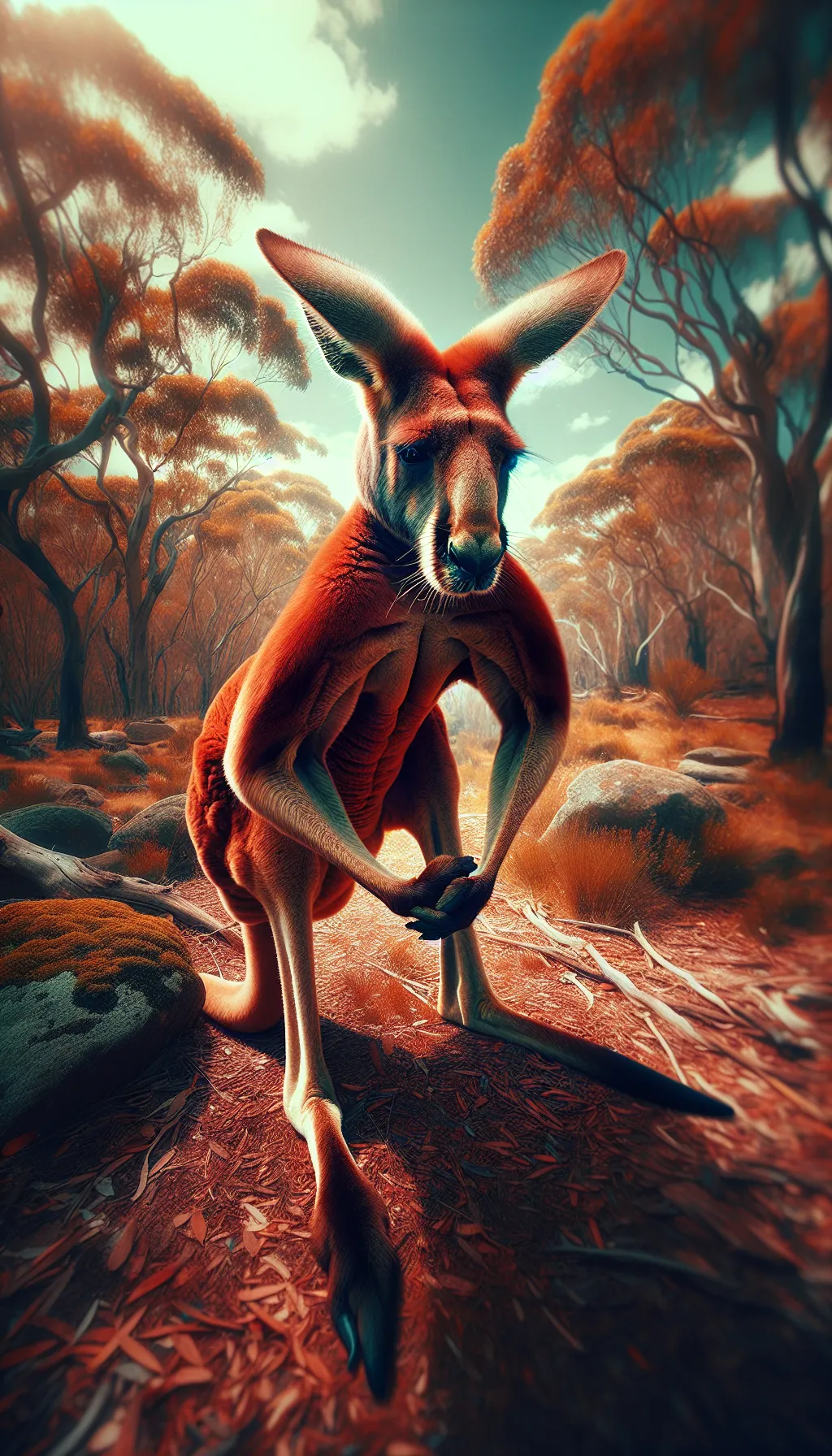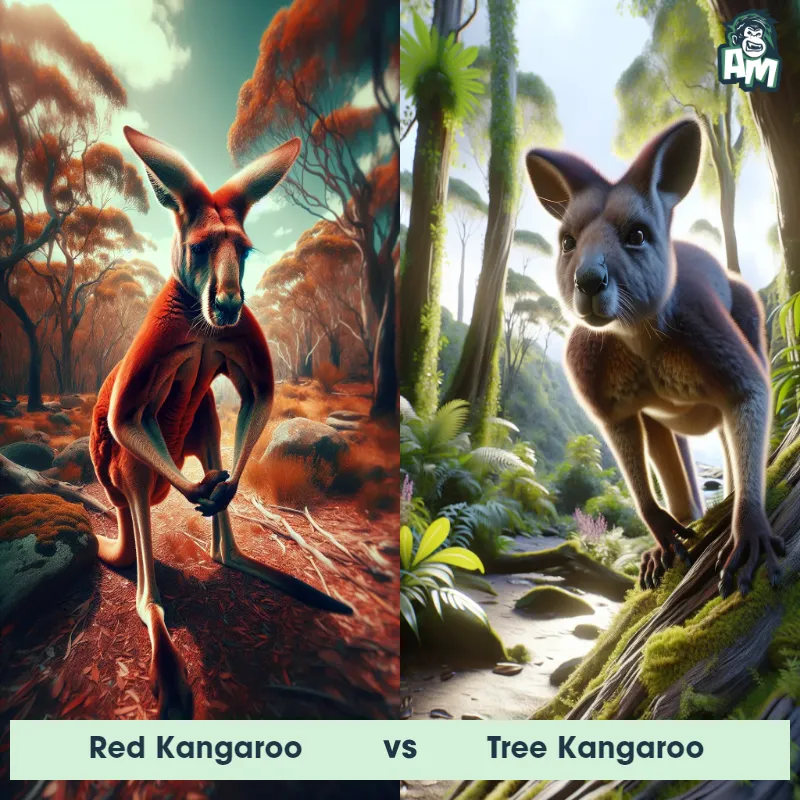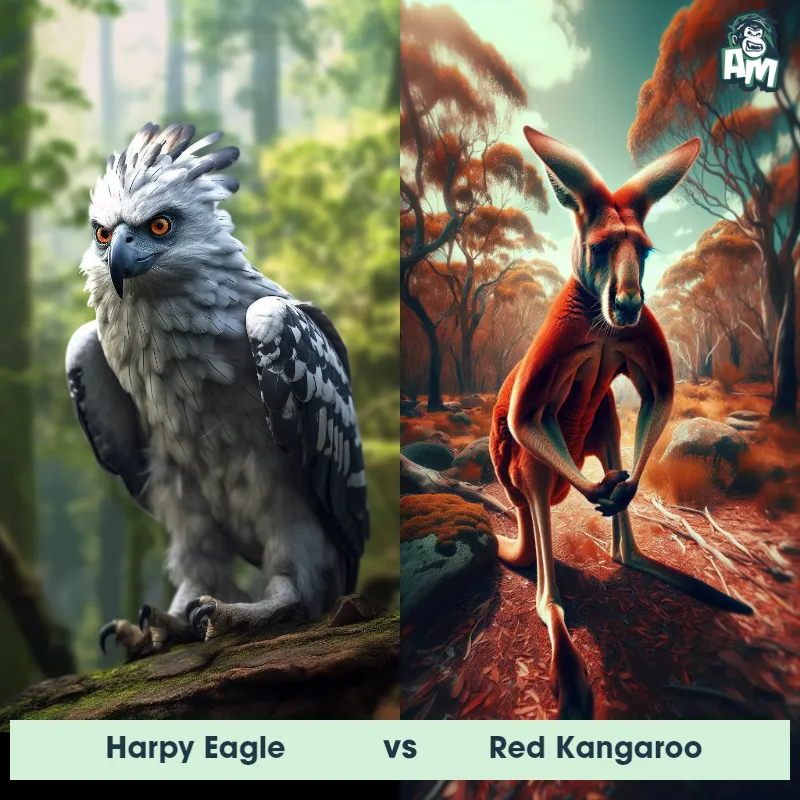The Red Kangaroo
The Red Kangaroo, also known as Macropus rufus, is the largest marsupial and the largest terrestrial mammal in Australia. It has distinctive features such as a powerful muscular build, a long and robust tail, strong hind legs with large feet, and small forelimbs. The fur of the Red Kangaroo is mostly reddish-brown in color, although it can vary from pale to dark shades depending on the individual. Males can reach heights up to 6 feet and weigh up to 200 pounds, while females are slightly smaller and lighter. They are well-adapted for their hopping locomotion, and can cover great distances at high speeds using their strong hind legs.

| Red Kangaroo | |
|---|---|
| Size | Up to 7 feet tall (2.1 meters) |
| Weight | Over 200 pounds (90.7 kilograms) |
| Speed | 35mph (56km/h) |
| Key Strength | Powerful hind legs for kicking |
| Biggest Weakness | Vulnerable to punches |
| Scientific Name | Macropus rufus |
| Family | Macropodidae |
| Habitat | Grasslands, open woodlands, and scrublands |
| Geography | Australia |
| Diet | Herbivore, primarily eats grass and leaves |
| Lifespan | 6 years - 8 years |

The Red Kangaroo
The Red Kangaroo, also known as Macropus rufus, is the largest marsupial and the largest terrestrial mammal in Australia. It has distinctive features such as a powerful muscular build, a long and robust tail, strong hind legs with large feet, and small forelimbs. The fur of the Red Kangaroo is mostly reddish-brown in color, although it can vary from pale to dark shades depending on the individual. Males can reach heights up to 6 feet and weigh up to 200 pounds, while females are slightly smaller and lighter. They are well-adapted for their hopping locomotion, and can cover great distances at high speeds using their strong hind legs.
Fun Fact: Red Kangaroos are excellent jumpers and can leap distances of up to 25 feet in a single bound, reaching heights of up to 10 feet, which is higher than an average human.
| Red Kangaroo | |
|---|---|
| Size | Up to 7 feet tall (2.1 meters) |
| Weight | Over 200 pounds (90.7 kilograms) |
| Speed | 35mph (56km/h) |
| Key Strength | Powerful hind legs for kicking |
| Biggest Weakness | Vulnerable to punches |
| Scientific Name | Macropus rufus |
| Family | Macropodidae |
| Habitat | Grasslands, open woodlands, and scrublands |
| Geography | Australia |
| Diet | Herbivore, primarily eats grass and leaves |
| Lifespan | 6 years - 8 years |
Red Kangaroo Matchups
We use AI to simulate matchups between the Red Kangaroo and other animals. Our simulation considers size, strength, and natural predatory behaviors to determine the most likely outcome.

Can't find the Matchup you want?
Create Your Own MatchupRed Kangaroo: Diet, Predators, Aggression, and Defensive Behaviors
What do Red Kangaroos eat?
Red Kangaroos are herbivores and mainly feed on grasses, leaves, and shrubs. They are primarily grazers and can survive on low-quality vegetation, making them well-adapted to the arid Australian outback.
Do Red Kangaroos have any predators?
Red Kangaroos do have natural predators, including dingoes, eagles, and more recently, introduced predators such as cats and foxes. However, their large size, speed, and strength make them less vulnerable to predation than smaller kangaroo species.
Are Red Kangaroos aggressive?
Red Kangaroos are not inherently aggressive towards humans, but they can become aggressive towards other kangaroos during mating season or when resources are scarce. They may exhibit aggressive behaviors such as kicking, boxing, or vocalizing to establish dominance or defend their territory.
Do Red Kangaroos fight?
Red Kangaroos are known for their boxing matches, which typically occur between males competing for dominance or access to females. They use their powerful hind legs to kick and their strong forearms to grapple with opponents in these intense territorial or mating disputes.
How do Red Kangaroos defend themselves?
Red Kangaroos have several defense mechanisms to protect themselves from predators or rivals. They can use their speed and agility to escape danger, their powerful hind legs to deliver devastating kicks, and their sharp claws to slash at attackers.
What is the biggest weakness of Red Kangaroos in a fight?
Despite their incredible strength and agility, the biggest weakness of Red Kangaroos in a fight is their reliance on hopping as a primary means of movement. While hopping allows them to cover vast distances quickly, it can also make them vulnerable to losing balance or being off-balance during physical confrontations with other kangaroos or predators.
Fun Fact: The Red Kangaroo is the national emblem of Australia and appears on the country's coat of arms, symbolizing the country's unique wildlife and natural heritage.
Fun Fact: Red Kangaroos have an incredible reproductive strategy called embryonic diapause, allowing them to pause the development of an embryo in their reproductive system until environmental conditions are favorable for the baby kangaroo to be born. This adaptation ensures that the young kangaroo has a high chance of survival in unpredictable and harsh Australian conditions.












